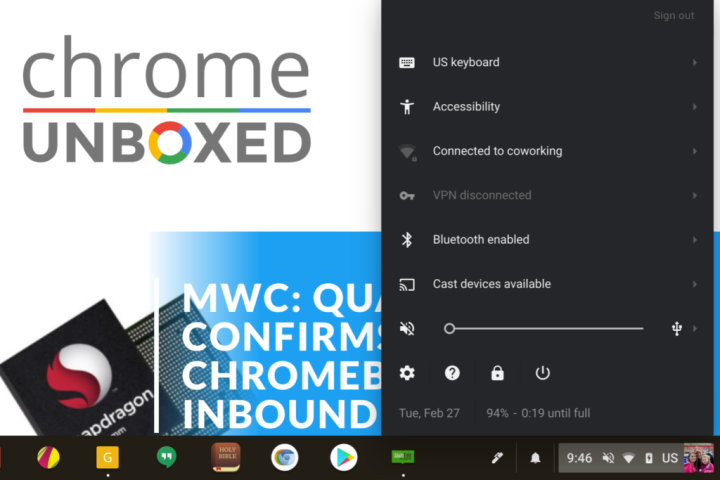
Let’s face it: Everyone likes a well-designed and well-implemented dark theme, no matter how frivolous or unnecessary it might seem at first glance. It’s a request as old as time itself from Android P users, and although Google has denied the rumors surrounding a dark mode on its mobile operating system, a report stemming from Chrome Unboxed suggests it’s coming soon to the company’s other operating system.
Chrome OS may not have a distinct identity or a cult following of loyalists dead set on grilling the competition, but it does have more than 25 million users and counting, which is nothing to scoff at. With Windows 10‘s Anniversary Update having introduced a dark mode back in summer 2016, it makes sense that Google would treat its Chromebook user base to a similar privilege.
Chrome Unboxed discovered the feature in a developer version of the Chrome OS not available to the general public. Originally, it was limited to the system tray and app launcher, but the outlet is now finding that it’s being more ubiquitously applied to all of its Chrome OS-based devices.
Given that most Chromebooks can now run Android apps with ease, via the Google Play Store, we would bet that it won’t be long before we begin to see a similar feature in the forthcoming Android P, or 9.0.
As of MacOS 10.12 Sierra, Apple’s laptop/desktop operating system also gives users access to a dark mode, however it only applies to the Dock and menu bar. Meanwhile, the Chrome OS dark theme appears to cover more ground.
It’s obvious why users would prefer a dark mode. It’s easier on the eyes in dim lighting, and even during the day with the windows open, it can be less of a distraction for some users. Most of all, though, it’s a nifty customization feature that should be there from the get-go for the sake of personal preference. Whether or not it will make it into a formal Chrome OS update remains to be seen.
Still, if one thing is for certain: Google is at least interested in teasing a dark mode for Chrome OS, or it would have left it out of its certain-to-be-leaked developer build.
Editors' Recommendations
- The most common Chromebook problems and how to fix them
- Google just made a big change to how Chromebooks apps work
- Why I converted my Windows laptop into a Chromebook, and why you should too
- Editing video on Chromebooks just got a lot easier
- How ChromeOS Flex turns old PCs into Chromebooks for free


